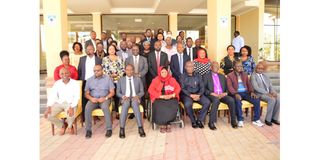The power of political will in fuelling the drive to zero malaria

- Parliamentarians from the Health and HIVAIDS Committee, TAPAMA and EMCT during a capacity-building workshop on malaria, RMNCAH, nutrition, and NTDs, supported by ALMA, Dodoma.
Malaria continues to be one of Africa’s biggest health problems, with the continent accounting for 95% of global malaria cases and 96% of related deaths. Uganda and Tanzania rank among the top ten countries with the highest burdens. For both, malaria is not just a health crisis; it is a socio-economic challenge, straining household incomes, burdening public health systems, and therefore slowing development.
The impact of malaria, which spans across all societal spheres, makes the reality that malaria is no one sector’s problem a reality. Health ministers and departments cannot win this fight without the support of lawmakers, community leaders, private sector actors, and citizens.
An all-of-society approach is not just important, it is essential. Among the most effective champions of this collective effort are parliamentarians. By leveraging their platforms, legislatures, and proximity to communities, they are uniquely positioned to ensure budget prioritisation, mobilise communities, influence policy, and ensure accountability.
In East Africa, the Tanzania Parliamentarians Against Malaria (TAPAMA) and the Uganda Parliamentary Forum on Malaria (UPFM) are leading by example. Their work demonstrates the significance of political will in accelerating progress.
Tanzania’s parliamentarians against malaria
In Tanzania, the fight against malaria is taking place not just in government offices or health facilities, but also on football pitches, community grounds, and the corridors of Parliament. The Tanzania Parliamentarians Against Malaria (TAPAMA) is re-imagining what legislative advocacy looks like by bringing together the power of political leaders, private sector players, and widely loved sports like football to strengthen national malaria response.
Comprised of 28 voluntary members of diverse political affiliations, TAPAMA’s partnership with local private sector companies has helped expand community outreach. These companies have donated mosquito nets, funded awareness campaigns, and supported malaria sensitisation sports leagues organised by TAPAMA. These community-driven events have helped turn malaria awareness into a local cause that communities can rally behind.
In Parliament, TAPAMA has lobbied for increased government funding, particularly for pregnant women in malaria-prone areas. Their advocacy has led to more treated mosquito nets being distributed, especially in regions with the highest infection rates. In 2024, TAPAMA members visited regions with high malaria prevalence, like Tabora, where they challenged regional and district authorities to improve malaria diagnosis and treatment practices, and influenced the Ministry of Health to priorities relevant interventions such as intensified distribution of treated nets in at-risk regions. They have also influenced central and local governments to allocate funds for bio-larviciding, leveraging a local manufacturer in Kibaha region for sustainable mosquito control.
Data has been central to TAPAMA’s work. With support from the African Leaders Malaria Alliance (ALMA), Tanzania’s parliamentarians have embraced a digital tool in their advocacy toolkit - the Malaria Scorecard Management Tool. Color-coded and easy to interpret, the scorecard allows legislators to understand key patterns in their constituencies and quickly identify gaps that need urgent attention.
Since 2020, 60 MPs and IT staff have been trained to use the scorecard to track key malaria indicators, identify service gaps in their regions, and advocate for targeted resource allocation.
This data-driven approach led to successful lobbying of the Ministry of Finance to secure US$70 million for malaria programmes from development partners, and improved integration of malaria into district planning and budget guidelines. TAPAMA also influenced local budgeting by advocating for the inclusion of malaria in district planning and budget guidelines. Members use scorecard data during oversight visits to monitor malaria services and supply chains.
In 2023, TAPAMA partnered with End Malaria Council Tanzania (EMCT) to review progress on malaria, tropical neglected diseases, and reproductive, maternal, child, youth, and adolescent health indicators and jointly urged the government and other sectors to increase investment in these towards attaining the national targets. Most recently (October 2024), they advocated for the rollout of the RTS, S and R21 malaria vaccines in collaboration with institutions such as the Ifakara Health Institute and 1Day Sooner, focusing on securing an enabling policy and financing environment for equitable access.
The group continues to champion innovations and government financing in vector control, including support for the ongoing process toward WHO certification of the Kibaha bio-larvicide factory. It is also advocating for improved LLIN durability with A-Z Textile Mills. In addition, TAPAMA is contributing to the development of a public-private partnership framework, building on existing collaborations with A-Z, to expand community outreach and mobilise additional resources. These efforts position TAPAMA as an essential link between evidence, policy, and local impact in Tanzania’s fight to eliminate.

- Parliament-led Walk Against Malaria held in Kampala, March 2025, bringing together youth, private sector actors, and other stakeholders in a united call to end malaria.
Uganda’s parliamentary forum on malaria
In Uganda, the Uganda Parliamentary Forum on Malaria (UPFM) has established strong foundations in community engagement. For the third year now, UPFM has led the Walk Against Malaria – a nationwide campaign led by parliamentarians and drawing the participation of other stakeholders, including the private sector, youth, community leaders, and health officials. The walk does not just raise awareness, it reaffirms the power of unity in fighting malaria. From urban centres like Kampala to rural, high-burden regions like Karamoja and the West Nile, the campaign sensitises citizens on the individual role that community members play in defeating malaria.
Inside Parliament, UPFM has played a key role in influencing health policy, including a 2022 review of the Public Health Act that strengthened governance structures for malaria control. UPFM also supports science-led innovations such as the Target Malaria project, hosted by the Uganda Virus Research Institute, a not-for-profit research consortium exploring gene drive technology as a potential future tool for malaria vector control. Recognising the need for an enabling legal environment, UPFM is actively building support for the Biosafety Bill, facilitating informed dialogue around safe research and potential future use of genetically modified mosquitoes. UPFM’s work in domestic resource mobilisation is equally impactful. In FY2024/25, following their advocacy, Parliament allocated UGX 5 billion specifically for the procurement of Fansidar (SP) to protect pregnant women from malaria, building on the UGX 2.6 billion provided through Global Fund support in the previous year. This raised the total allocation for Fansidar to UGX 7.6 billion, enabling full coverage of the Ministry of Health’s projected needs for the first time. This milestone was part of a broader commitment to strengthening access to essential medicines and health supplies (EMHS), reflected in Parliament’s approval of an additional UGX 135 billion. The increase signals growing recognition of the importance of sustained investments in frontline malaria interventions, made possible through effective cross-sectoral collaboration and the dedicated efforts of health champions in Parliament, including the Deputy Speaker.
Sustaining political will for the big push against malaria
Too often, it is said that “a lack of political will” is one of the reasons that healthcare systems struggle across Africa, impacting progress against many of the preventable diseases, including malaria. However, countries like Tanzania and Uganda are proving the contrary, they are showing a sobering awareness of the role that community leaders can play in and out of office. Their efforts echo the 2024 Yaoundé Declaration, where Health Ministers from ten African countries (including Tanzania and Uganda), shouldering the highest malaria burden in terms of cases and related deaths, pledged to leverage all levels of political leadership to strengthen health systems, especially malaria programs. This momentum aligns with the recent approval by Heads of State and Government at the African Union of the Africa Health Strategy roadmap, which will help to accelerate progress towards the achievement of the AU Catalytic Framework to End AIDs, TB, and Eliminate Malaria in Africa by 2030, demonstrating high-level political commitment to health across the continent.
As Africa faces a perfect storm characterised by a combination of multiple challenges ranging from climate change, humanitarian crises, drug and insecticide resistance to funding gaps, a big push is necessary to stay ahead of malaria. The political will and leadership, as demonstrated by parliamentarians in Tanzania and Uganda, are essential ingredients to this push. Only through coordinated action across all levels and strong leadership across the board can we truly accelerate towards zero malaria.


